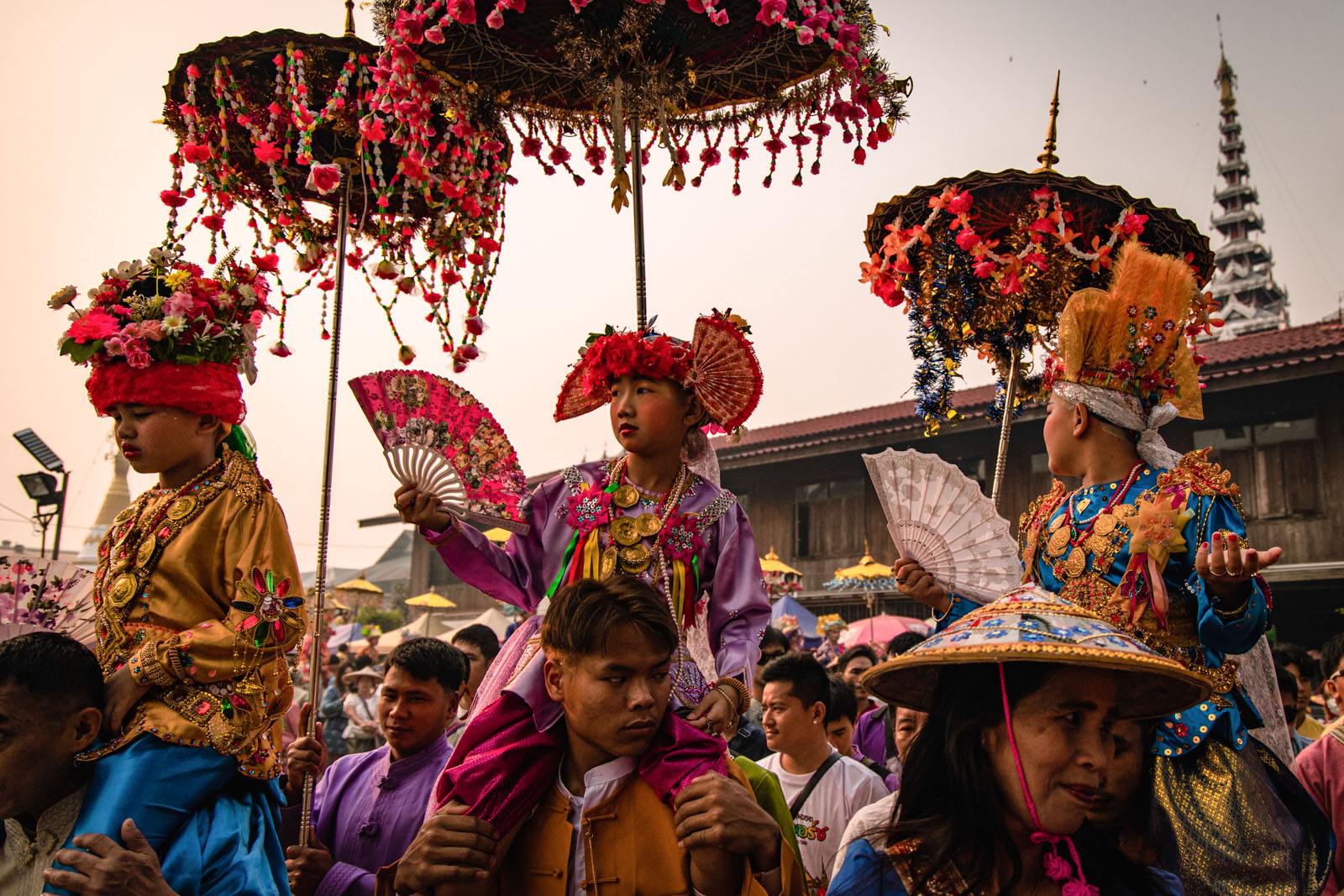This article was originally published on HaRDstories.
After decades of campaigning, Thailand’s six million indigenous people stand at the threshold of legal recognition. A landmark bill, set for July vote, could transform their struggle against statelessness, criminalisation on ancestral lands, and cultural erasure.
Kraingkai Chichuang’s hand-woven brown Karen top and turban stood out amid the sea of dark suits in Thailand’s riverside parliament this April. As he and fellow indigenous council members took their places, their vibrant traditional embroidery offered a rare glimpse of the country’s cultural diversity in these halls of power – a diversity that, after decades of struggle, might finally gain legal recognition.
Kraingkai stood and addressed the senators during their weekly meeting, his voice steady despite the stakes. It was a pivotal moment for him and the other six million indigenous people living in Thailand to secure, for the first time, a place in the law.
“I would like to speak up – not to raise any conflict, but to answer your doubts,” said the chairman of Thailand’s Council of Indigenous Peoples, which represents more than forty ethnic groups nationwide. “Having this bill would not grant us any privilege, but would lift our restricted access to rights. We are already equal as Thai citizens.”
With a population of about six million spread across sixty groups, the country’s indigenous people remain marginalised – many stateless, others treated with prejudice and routinely criminalised on their ancestral lands in confrontation with modern conservation laws. The Ethnic Protection Bill (not Indigenous Bill, for reasons that will become clear) aims to safeguard their rights and honour their traditions of living in harmony with nature. Parliament is scheduled to vote on the bill in July.
But promoting diversity is a complex challenge in a nation where the majority takes pride in a strong sense of “Thainess” – a nationalistic identity that many Thais credit with helping the country avoid Western colonisation. United by a coalition of community leaders, journalists and politicians, the indigenous movement has rallied around a single goal: better legislation that respects their fundamental rights.

The first law for indigenous communities
Kraingkai remembers watching his family’s farm in Thailand’s western forest complex transform each time he returned from high school breaks. Like a student on vacation, the small plot of land would get a rest after nurturing various kinds of rice and vegetables for seasons.
“My father gradually shifted from rotational farming to monocropping,” said Kraingkai. “Our Karen traditions are fading through years of urbanisation and shrinking farmland.”
Many indigenous communities inhabit forest and coastal areas that have been declared national parks under the state’s conservation efforts. This has ignited seemingly endless conflicts between local communities and the state. There are more than 300,000 indigenous families living in the protected area, according to the Department of National Parks.
While indigenous people are often romanticised in organic coffee advertisements and slow-living lifestyle blogs, Thailand has a long way to go to build a truly inclusive society. Currently, the country has no laws specifically protecting indigenous communities – which is exactly what Kraingkai and his allies are fighting to change.
“Our constitution says all Thais are to be treated equally. But in reality, ethnic groups still face discrimination in law and in everyday life,” said Kraingkai. “Our people are still treated with suspicion at hospitals just for speaking with accents.”
Having legislation specifically for indigenous communities would provide stronger legal protections that the Constitution currently fails to deliver. The Ethnic Bill would craft tailored solutions for their inadequate access to basic rights and land conflicts, accounting for their cultural differences, explained Apinan Thammasena, an anthropologist at the Princess Maha Chakri Sirindhorn Anthropology Centre.
“It’s not about taking something away from Thai people and giving it to a new group of people. These are the fundamental rights that Thais of different cultural backgrounds have been restricted to access,” Apinan said. “How do we lift up those from below to stand adequately with the rest?”
In 2014, the Council of Indigenous Peoples first proposed the idea of indigenous law to parliament, but political hurdles delayed the movement until 2022 when the Council resubmitted the draft, backed by more than 10,000 supporters. The bill, later combined with four other drafts, advanced to parliamentary vote last year.
Comprising 47 provisions, the Ethnic Bill would legally recognise their identities, affirm their access to fundamental rights as Thai citizens, and address common issues facing the communities such as cultural erosion, land disputes and displacement from development projects.
From mountain village to parliament
Nearly a thousand kilometres from his remote village in Thailand’s mountainous northern border, Laofang Bundidterdsakul serves as one of the country’s first indigenous politicians. As a member of the progressive People’s Party, he advocates for indigenous people in parliament and sits on the bill’s drafting committee.
Despite reassurances from fellow politicians and state workers about their concern for indigenous communities, Laofang has found that many still oppose legislation specifically for these groups. They argue that indigenous communities should not receive special treatment since the Thai constitution already guarantees equal rights for all.
“I used to think urban people didn’t understand what indigenous communities struggle with,” said Laofang. “Actually they do, but certain biases hold them back when making these important decisions. They don’t see the imbalanced power structure that prevents indigenous people from accessing the same fundamental rights as others.”
A Hmong law graduate, Laofang spent years helping indigenous communities in Mae Hong Son, a forested province with Thailand’s largest indigenous population while ranking as the nation’s poorest region. Their challenges include poor road conditions and lack of electricity. Installing infrastructure requires navigating a labyrinthine bureaucracy since the communities live within protected forest areas, not to mention the meager budgets allocated to these remote regions.
Diluting rights through language?
Thailand signed the UN Declaration on the Rights of Indigenous Peoples in 2007, but its national-level version, the Ethnic Bill – seen by HaRDstories –, has diluted several provisions through less legally binding language. One of the main points of contention was the term “indigenous people” itself, which implies belonging to ancestral land and rights to self-determination.
The term makes many Thai policymakers uncomfortable, as it does other Southeast Asian governments, so parliament decided to drop it in favour of “ethnic groups.”
“Thailand created the sense of Thainess as a shared identity to build a nation-state against colonisation threats centuries ago,” explained Anthropologist Apinan.
He added that this shared identity was reinforced during the Cold War for national security purposes. Officials made various efforts to integrate indigenous groups into Thainess, including requiring them to speak Thai rather than their local languages.
However, “if those differences couldn’t be integrated, they were portrayed negatively as outsiders or enemies of the state,” said Apinan. “That’s how indigenous communities became labeled as drug dealers or the cause of deforestation.”
Reclaiming their narrative
The front page of a major Thai newspaper made Rfu Ba-cher seethe. The headline screamed: “CHIANG MAI SUFFERS. HILL TRIBE SLASH-AND-BURN AGAIN.”
At the start of the 2019 rainy season, thirty indigenous people marched to the news outlet’s office, demanding they retract the damaging label. Rfu, a quiet Akha cameraman, livestreamed the protest.
Though many factors contribute to pollution, and indigenous communities often serve as the front line against forest fires, their traditional practice of burning agricultural waste has been demonised by the media as a major cause of air pollution.
Rfu’s small team at the Indigenous Media Network (IMN), the only indigenous-led media platform in Thailand, has been battling such negative portrayals since 2015.
“When any news outlet or influencer makes discriminatory statements, intentionally or not, IMN pushes back against it,” explained Rfu. “We’ve encountered public stigma about indigenous people being dirty, involved with drug cartels, or responsible for deforestation. We’ve even sent journalists guidelines on how to report on our communities.”
Anthropologist Apinan believes that while many Thais still harbour prejudice toward indigenous communities, the bill presents an opportunity to build positive narratives and prevent conflicts arising from cultural differences.
“The bill would benefit non-indigenous people too. Economically, it will empower indigenous communities struggling with inequalities,” said Apinan. “And it will promote cultural assets that Thailand likes to call ‘soft power.’”
Fighting for space to live – and die
Orawan Hanta-le always believed she would be buried beside her beloved ocean, following the tradition of her Moken sea nomad ancestors. Now, with luxury resorts lining the shore, she’s no longer certain.
Southern Thailand’s sea nomads – about 16,000 people who have reluctantly traded their floating homes for permanent villages – now find themselves struggling to access fishing grounds under national park management. There’s no space left for the living, nor for the dead. Traditionally, communities bury their ancestors near the beach, but these locations have become tourism hotspots.
In 2010, Thailand struck a landmark deal with sea nomads and the Karen community to support their traditional livelihoods. Though not legally binding, this agreement signalled the government’s willingness to preserve their traditions and helped pave the way for the Ethnic Bill.
Orawan’s community in Phang Nga province pioneered the concept of a “Protected Ethnic Area” by inviting tourists to stay with them and learn about their seafaring ways. They hoped this symbolic declaration would gain legal standing in the Ethnic Bill, granting indigenous communities rights to co-manage natural resources with the state, similar to indigenous reservations in the U.S. or customary governance in Indonesia.
But policymakers voted against the concept in early 2025. The term “Protected Ethnic Area” remains in the final text, but language that would have strengthened land tenure for indigenous communities was struck out.
“I cried in secret after the vote,” said Orawan, who represented sea nomads in the drafting process. “Our right to keep our ancestral land rests on verbal agreements with local authorities. We need this protection in law.”
Despite their disappointment, Orawan and the indigenous movement remain determined to pass the Ethnic Bill this year. They hope that the five-year review cycle will offer a chance to strengthen the law when, hopefully, the public better understands indigenous communities.
“We’ve come so far, from being unrecognised to where we are today. From daring to write law, we’re finally in the final process to pass the bill,” said Orawan. “Though this bill isn’t perfect, let’s secure it first. One day we’ll make it better.”
Edited by Fabian Drahmoune
Nicha Wachpanich is a Bangkok-based journalist covering stories from a rights-based and human-interest perspective. She previously worked with a local environmental news agency under Thai Society of Environmental Journalists.
